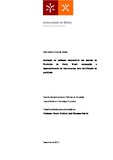Avaliação de software educacional nas escolas do Município de Natal, Brasil: concepção e desenvolvimento de instrumentos para certificação de qualidade

Visualizar/
Data
2016-12-15Autor
Mattos, Mára Beatriz Pucci de
http://lattes.cnpq.br/9900708846717024
Metadado
Mostrar registro completoResumo
The democratization of science and technology is part of the human rights role, befits the constitutional provisions and the state's duty to encourage the inclusion of ICT, scientific and technological training. This study investigates the evaluation of educational software in the Natal schools, Brazil, for the conception and development of instruments for quality certification. The evaluation software, when systematized and shaped in the school context, is part of the curriculum courses and pedagogical projects, to committed educational actors to democratic participation, without submission to the hegemonic elites, to the purposes and interests of markets and. It is need for governments, as strong protagonists of the inclusion of software in education, fostering the efficiency of education systems and public munus, through compliance actions, so that the school community and civil society to participate in the software evaluation, aligning quality with the costs for the benefit of the needs and educational goals. In this study, the option by the Joint Method promotes the merger of the investigative traditions and the integration of strengths and data from qualitative research with the Quantitative Research, which guide the logical strategies and procedures for selection of the population and the sampling protocols (interview, visits and surveys), analysis and reflection of the data. In the way of research, the dialectic of knowledge is light and interpretive lens of constructivist theories and sociointeractionists, Social Pedagogy, digital aesthetic and Neuroscience to clarify concepts, answer the questions and achieve the goals. The problematics of data from teachers and administrators to generate a more comprehensive perception of the profile, training and teaching and learning, builds a reflective process, produces diagnostic assessment of the situation of educational software and proposes a solution: the design of the Software Evaluation Methodology educational - MASE. The participation of governments, organizations and society in the evaluation of educational software enhances the exercise of citizenship and allows assess the benefits and limitations of TIC in favor of improving education, technodemocracy and excellence of the Brazilian educational software.



